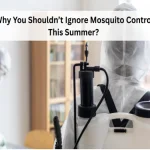Mosquito control is essential for supermarkets to maintain a clean and safe environment for customers and employees. Mosquitoes can carry diseases and cause discomfort, which may impact your store’s reputation and customer experience. Effective mosquito control helps prevent infestations and protects your food products from contamination.
Your supermarket’s outdoor areas, including entrances, parking lots, and loading docks, are common breeding grounds for mosquitoes. Key strategies for reducing their numbers around your property include managing standing water and employing targeted insecticide treatments. Regular inspections and mosquito control measures ensure these pests do not become a persistent problem.
Implementing a mosquito control plan can minimize health risks and avoid disruptions in your daily operations. Understanding how these methods apply specifically to supermarkets will help you maintain a hygienic space that meets health standards and keeps shoppers comfortable.
Understanding Mosquito Risks in Supermarkets
Mosquitoes in supermarkets create specific challenges that affect both operations and customer satisfaction. Identifying how these insects enter, their risks to health and safety, and their impact on the shopping environment is essential for effective mosquito control in supermarkets.
Common Mosquito Entry Points

Mosquitoes often enter grocery stores through open doors, loading docks, and poorly sealed windows. Delivery areas without proper screening are frequent access points for pest control in grocery stores in McKinney.
Standing water near entrances or in drainage systems attracts mosquitoes looking to breed. Even small puddles in outdoor waste areas or flower displays can serve as breeding grounds.
Maintaining physical barriers and monitoring these entry points reduces the chance of infestation. Regular inspections around service entrances and outdoor areas are critical in mosquito management in grocery facilities.
Health and Safety Concerns
Mosquitoes carry diseases that can contaminate food or surfaces in supermarkets. While the risk of disease transmission inside stores is low, its presence reflects poor facility hygiene and can violate health codes.
In addition to disease, their bites cause allergic reactions in some customers and employees. This potential for discomfort raises concerns for workplace safety and customer well-being.
Ensuring pest control in grocery stores in McKinney includes mosquito management, which helps meet regulatory health standards and minimizes liability related to bites or contamination.
Impact on Customer Experience
Mosquitoes in shopping aisles or produce sections create an unpleasant environment, discouraging repeat visits. Customers notice pest activity and may associate it with a general lack of cleanliness.
Negative customer perception can directly affect sales and the store’s reputation. Product handling disruptions due to mosquito infestations also affect staff efficiency.
Implementing effective mosquito control for supermarkets supports a positive, comfortable shopping experience and protects your brand image.
Effective Mosquito Prevention Strategies

Combining targeted control methods with consistent upkeep can significantly reduce mosquito presence. Focusing on proactive treatment measures and proper facility care helps maintain a safe environment in your supermarket.
Integrated Pest Management Approaches
Integrated pest management (IPM) combines multiple control tactics for effective supermarket mosquito prevention. Start by identifying mosquito breeding sites around your facility. Use larvicides in standing water areas that cannot be removed, like drains or gutters.
Incorporate adult mosquito control methods such as targeted insecticide sprays in limited areas, especially during peak mosquito activity times. Consider installing mosquito traps near entrances and loading docks to monitor and reduce populations.
Routine inspections are essential to ensure treatment is effective. Record methods and results to adapt your strategy based on changing conditions around your commercial space. This structured approach to mosquito treatment in retail stores maximizes efficiency and minimizes chemical use.
Best Practices for Facility Maintenance
Maintaining your commercial property is critical for ongoing mosquito control, as supermarkets require. Eliminate standing water by regularly checking containers, plant saucers, and equipment outside the building.
Ensure gutters and drains are clean, free-flowing, and properly designed to avoid water pooling. Trim vegetation away from building perimeters, as dense plants provide resting places for adult mosquitoes.
Seal gaps in doors, windows, and walls to reduce indoor entry points. Use screens or air curtains at entrances where needed. These maintenance actions cut mosquito breeding potential and limit their access to customers and employees, strengthening your overall prevention efforts.
Choosing Mosquito Control Solutions for Retail Stores
Effective mosquito control requires safe solutions for food retail environments and customers. Options must reduce mosquito presence without compromising hygiene or store appearance. Professional services must comply with local health regulations and provide reliable, ongoing protection.
Mosquito Repellent Options for Supermarkets
When choosing mosquito repellent solutions for supermarkets, prioritize non-toxic, food-safe products. Look for EPA-registered insecticides labeled explicitly for use in food retail settings in McKinney. Standard options include ULV foggers, mosquito traps, and larvicides applied near exterior entry points.
Electronic repellents and natural oil-based sprays can supplement treatments, but usually don’t offer full control. Avoid sprays that leave strong odors or residues on surfaces where food is exposed. Space treatments to effectively target both indoor and outdoor areas, especially in loading docks and entrances.
Selecting Professional Pest Control Services
A professional pest control company experienced in insect control for food retail in McKinney is essential. Choose providers who use integrated pest management (IPM) strategies combining inspection, treatment, and monitoring with minimal chemical use.
Ensure the company documents its protocols and uses EPA-approved products that are safe for supermarkets. Confirm it has experience handling mosquito control specifically around retail environments to avoid store disruption during business hours.
Ask for service contracts that include regular visits and quick response times for outbreaks. A local company familiar with McKinney’s climate and mosquito habits will offer the most effective service.
Compliance with Local Regulations
Mosquito control in food retail settings must comply with local health and environmental regulations. In McKinney, treatments must adhere to Texas Department of State Health Services guidelines.
You must ensure that pesticides are applied by certified professionals and that all records are maintained for inspections. To avoid contamination risks, follow proper storage, handling, and disposal instructions for repellents.
Regular audits and training for your staff on mosquito prevention and control procedures can help maintain compliance and protect public health.
Critter Stop offers expert humane wildlife and pest removal services tailored for businesses like yours. Call (214) 234-2616 for a free inspection to address your mosquito and pest issues. Critter Stop is highly regarded in McKinney for delivering dependable work and exceptional customer care.






